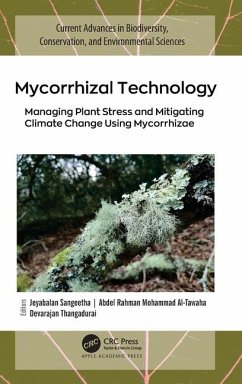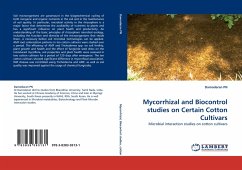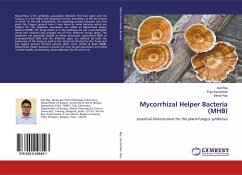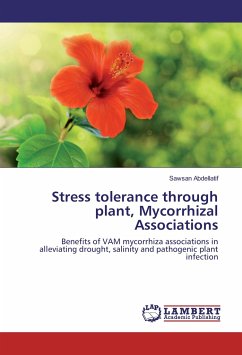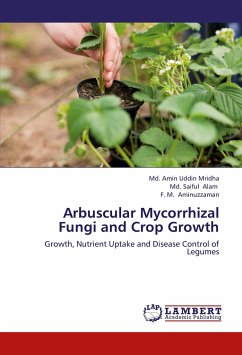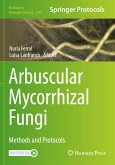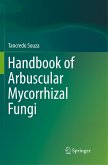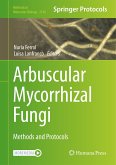Mycorrhizal Technology
Managing Plant Stress and Mitigating Climate Change Using Mycorrhizae
Herausgeber: Sangeetha, Jeyabalan; Thangadurai, Devarajan; Mohammad Al-Tawaha, Abdel Rahman
Mycorrhizal Technology
Managing Plant Stress and Mitigating Climate Change Using Mycorrhizae
Herausgeber: Sangeetha, Jeyabalan; Thangadurai, Devarajan; Mohammad Al-Tawaha, Abdel Rahman
- Gebundenes Buch
- Merkliste
- Auf die Merkliste
- Bewerten Bewerten
- Teilen
- Produkt teilen
- Produkterinnerung
- Produkterinnerung
Examines the studies on mycorrhizal technology that show the positive impact of root symbiosis on plant adaptation to climate-associated abiotic stressors, such as salinity, drought, flooding, and high temperatures.
Andere Kunden interessierten sich auch für
![Mycorrhizal and Biocontrol studies on Certain Cotton Cultivars Mycorrhizal and Biocontrol studies on Certain Cotton Cultivars]() DamodaranMycorrhizal and Biocontrol studies on Certain Cotton Cultivars51,99 €
DamodaranMycorrhizal and Biocontrol studies on Certain Cotton Cultivars51,99 €![Mycorrhizal Helper Bacteria (MHB) Mycorrhizal Helper Bacteria (MHB)]() Asit RayMycorrhizal Helper Bacteria (MHB)36,99 €
Asit RayMycorrhizal Helper Bacteria (MHB)36,99 €![Stress tolerance through plant, Mycorrhizal Associations Stress tolerance through plant, Mycorrhizal Associations]() Sawsan AbdellatifStress tolerance through plant, Mycorrhizal Associations32,99 €
Sawsan AbdellatifStress tolerance through plant, Mycorrhizal Associations32,99 €![Arbuscular Mycorrhizal Fungi and Crop Growth Arbuscular Mycorrhizal Fungi and Crop Growth]() Md. A. U. MridhaArbuscular Mycorrhizal Fungi and Crop Growth38,99 €
Md. A. U. MridhaArbuscular Mycorrhizal Fungi and Crop Growth38,99 €![Arbuscular Mycorrhizal Fungi Arbuscular Mycorrhizal Fungi]() Arbuscular Mycorrhizal Fungi97,99 €
Arbuscular Mycorrhizal Fungi97,99 €![Handbook of Arbuscular Mycorrhizal Fungi Handbook of Arbuscular Mycorrhizal Fungi]() Tancredo SouzaHandbook of Arbuscular Mycorrhizal Fungi119,99 €
Tancredo SouzaHandbook of Arbuscular Mycorrhizal Fungi119,99 €![Arbuscular Mycorrhizal Fungi Arbuscular Mycorrhizal Fungi]() Arbuscular Mycorrhizal Fungi149,99 €
Arbuscular Mycorrhizal Fungi149,99 €-
-
-
Examines the studies on mycorrhizal technology that show the positive impact of root symbiosis on plant adaptation to climate-associated abiotic stressors, such as salinity, drought, flooding, and high temperatures.
Hinweis: Dieser Artikel kann nur an eine deutsche Lieferadresse ausgeliefert werden.
Hinweis: Dieser Artikel kann nur an eine deutsche Lieferadresse ausgeliefert werden.
Produktdetails
- Produktdetails
- Verlag: Apple Academic Press
- Seitenzahl: 304
- Erscheinungstermin: 9. Januar 2024
- Englisch
- Abmessung: 240mm x 161mm x 21mm
- Gewicht: 622g
- ISBN-13: 9781774915103
- ISBN-10: 1774915103
- Artikelnr.: 69433446
- Herstellerkennzeichnung
- Libri GmbH
- Europaallee 1
- 36244 Bad Hersfeld
- gpsr@libri.de
- Verlag: Apple Academic Press
- Seitenzahl: 304
- Erscheinungstermin: 9. Januar 2024
- Englisch
- Abmessung: 240mm x 161mm x 21mm
- Gewicht: 622g
- ISBN-13: 9781774915103
- ISBN-10: 1774915103
- Artikelnr.: 69433446
- Herstellerkennzeichnung
- Libri GmbH
- Europaallee 1
- 36244 Bad Hersfeld
- gpsr@libri.de
Jeyabalan Sangeetha, PhD, is Assistant Professor in the Department of Environmental Science at Central University of Kerala, Kasaragod, South India. She has edited/coedited several books in her research areas, which include environmental toxicology, environmental microbiology, environmental biotechnology, and environmental nanotechnology. She earned her BSc in Microbiology and PhD in Environmental Science from Bharathidasan University, Tiruchirappalli, Tamil Nadu, India. She holds an MSc in Environmental Science from Bharathiar University, Coimbatore, Tamil Nadu, India. She is the recipient of a Tamil Nadu Government Scholarship and a Rajiv Gandhi National Fellowship of the University Grants Commission, Government of India, for her doctoral studies. She served as Dr. D.S. Kothari Postdoctoral Fellow and UGC Postdoctoral Fellow at Karnatak University, Dharwad, South India, during 2012-2016 with funding from the University Grants Commission, Government of India, New Delhi. Abdel Rahman Mohammad Al-Tawaha, PhD, is a full Professor of Plant Science, former Head of the Department of Biological Sciences, and former Director of Planning, Information and Quality Unit at Al Hussein Bin Talal University, Jordan. He earned his PhD at McGill University, Montreal, Canada, in 2006. He is the author/coauthor of more than 200 publications in plant science in leading peer-reviewed journals and chapters in edited volumes and books on a broad range of development issues. He is the Founder and Editor-in-Chief of Advances in Environmental Biology. He is also participated in many international conferences as chair or member of the scientific committees. Devarajan Thangadurai, PhD, is Associate Professor at Karnatak University in South India. He has authored/edited over 30 books with national and international publishers and has visited 24 countries in Asia, Europe, Africa, and the Middle East for academic visits, scientific meetings, and international collaborations. He received his PhD in Botany from Sri Krishnadevaraya University in South India as a CSIR Senior Research Fellow with funding from the Ministry of Science and Technology, Government of India. He served as a Postdoctoral Fellow at the University of Madeira, Portugal; University of Delhi, India; and ICAR National Research Centre for Banana, India. He is the recipient of a Best Young Scientist Award with a Gold Medal from Acharya Nagarjuna University, India, and the VGST-SMYSR Young Scientist Award of the Government of Karnataka, Republic of India.
PART I: MYCORRHIZAL PRODUCTION FOR PLANT GROWTH, PHOSPHORUS METABOLISM, AND
BIOLOGICAL CONTROL 1. Types, Importance, and Factors Affecting Mycorrhiza
Production for Sustainable Plant Growth 2. Mycorrhizal Role in Phosphorus
Metabolism 3. Mycorrhiza as a Biocontrol Agent PART II: MYCORRHIZAE IN
AGRICULTURAL, HORTICULTURAL, AND BIOTECHNOLOGICAL SECTORS 4. Application of
Arbuscular Mycorrhiza Fungi in Agricultural and Horticultural Crops 5.
Arbuscular Mycorrhiza in Citrus 6. Arbuscular Mycorrhizal Biotechnology and
Its Applications PART III: MYCORRHIZAL FUNGI FOR MANAGING BIOTIC AND
ABIOTIC STRESSES IN CROP PLANTS 7. Arbuscular Mycorrhiza under Biotic and
Abiotic Stress 8. Role of Mycorrhizal Fungi in Plant Growth: Implications
in Abiotic Stress Tolerance 9. Arbuscular Mycorrhizal Fungi in Salinity
Tolerance and Growth Response in Plants under Salt Stress Conditions 10.
Arbuscular Mycorrhizal Fungi in Alleviation of Cold Stress in Plants PART
IV: MYCORRHIZAL FUNGI FOR SUSTAINABLE AGRICULTURAL DEVELOPMENT, MITIGATING
CLIMATE CHANGE, ENSURING FOOD SECURITY, AND GLOBAL ENVIRONMENTAL
SUSTAINABILITY 11. Role of AMF in Sustainable Agriculture 12. Mitigating
Climate Change and Ensuring Food Security through Application of Mycorrhiza
in the Climate-Smart Farming System 13. Impact of Arbuscular Mycorrhizal
Fungi in Global Sustainable Environment
BIOLOGICAL CONTROL 1. Types, Importance, and Factors Affecting Mycorrhiza
Production for Sustainable Plant Growth 2. Mycorrhizal Role in Phosphorus
Metabolism 3. Mycorrhiza as a Biocontrol Agent PART II: MYCORRHIZAE IN
AGRICULTURAL, HORTICULTURAL, AND BIOTECHNOLOGICAL SECTORS 4. Application of
Arbuscular Mycorrhiza Fungi in Agricultural and Horticultural Crops 5.
Arbuscular Mycorrhiza in Citrus 6. Arbuscular Mycorrhizal Biotechnology and
Its Applications PART III: MYCORRHIZAL FUNGI FOR MANAGING BIOTIC AND
ABIOTIC STRESSES IN CROP PLANTS 7. Arbuscular Mycorrhiza under Biotic and
Abiotic Stress 8. Role of Mycorrhizal Fungi in Plant Growth: Implications
in Abiotic Stress Tolerance 9. Arbuscular Mycorrhizal Fungi in Salinity
Tolerance and Growth Response in Plants under Salt Stress Conditions 10.
Arbuscular Mycorrhizal Fungi in Alleviation of Cold Stress in Plants PART
IV: MYCORRHIZAL FUNGI FOR SUSTAINABLE AGRICULTURAL DEVELOPMENT, MITIGATING
CLIMATE CHANGE, ENSURING FOOD SECURITY, AND GLOBAL ENVIRONMENTAL
SUSTAINABILITY 11. Role of AMF in Sustainable Agriculture 12. Mitigating
Climate Change and Ensuring Food Security through Application of Mycorrhiza
in the Climate-Smart Farming System 13. Impact of Arbuscular Mycorrhizal
Fungi in Global Sustainable Environment
PART I: MYCORRHIZAL PRODUCTION FOR PLANT GROWTH, PHOSPHORUS METABOLISM, AND
BIOLOGICAL CONTROL 1. Types, Importance, and Factors Affecting Mycorrhiza
Production for Sustainable Plant Growth 2. Mycorrhizal Role in Phosphorus
Metabolism 3. Mycorrhiza as a Biocontrol Agent PART II: MYCORRHIZAE IN
AGRICULTURAL, HORTICULTURAL, AND BIOTECHNOLOGICAL SECTORS 4. Application of
Arbuscular Mycorrhiza Fungi in Agricultural and Horticultural Crops 5.
Arbuscular Mycorrhiza in Citrus 6. Arbuscular Mycorrhizal Biotechnology and
Its Applications PART III: MYCORRHIZAL FUNGI FOR MANAGING BIOTIC AND
ABIOTIC STRESSES IN CROP PLANTS 7. Arbuscular Mycorrhiza under Biotic and
Abiotic Stress 8. Role of Mycorrhizal Fungi in Plant Growth: Implications
in Abiotic Stress Tolerance 9. Arbuscular Mycorrhizal Fungi in Salinity
Tolerance and Growth Response in Plants under Salt Stress Conditions 10.
Arbuscular Mycorrhizal Fungi in Alleviation of Cold Stress in Plants PART
IV: MYCORRHIZAL FUNGI FOR SUSTAINABLE AGRICULTURAL DEVELOPMENT, MITIGATING
CLIMATE CHANGE, ENSURING FOOD SECURITY, AND GLOBAL ENVIRONMENTAL
SUSTAINABILITY 11. Role of AMF in Sustainable Agriculture 12. Mitigating
Climate Change and Ensuring Food Security through Application of Mycorrhiza
in the Climate-Smart Farming System 13. Impact of Arbuscular Mycorrhizal
Fungi in Global Sustainable Environment
BIOLOGICAL CONTROL 1. Types, Importance, and Factors Affecting Mycorrhiza
Production for Sustainable Plant Growth 2. Mycorrhizal Role in Phosphorus
Metabolism 3. Mycorrhiza as a Biocontrol Agent PART II: MYCORRHIZAE IN
AGRICULTURAL, HORTICULTURAL, AND BIOTECHNOLOGICAL SECTORS 4. Application of
Arbuscular Mycorrhiza Fungi in Agricultural and Horticultural Crops 5.
Arbuscular Mycorrhiza in Citrus 6. Arbuscular Mycorrhizal Biotechnology and
Its Applications PART III: MYCORRHIZAL FUNGI FOR MANAGING BIOTIC AND
ABIOTIC STRESSES IN CROP PLANTS 7. Arbuscular Mycorrhiza under Biotic and
Abiotic Stress 8. Role of Mycorrhizal Fungi in Plant Growth: Implications
in Abiotic Stress Tolerance 9. Arbuscular Mycorrhizal Fungi in Salinity
Tolerance and Growth Response in Plants under Salt Stress Conditions 10.
Arbuscular Mycorrhizal Fungi in Alleviation of Cold Stress in Plants PART
IV: MYCORRHIZAL FUNGI FOR SUSTAINABLE AGRICULTURAL DEVELOPMENT, MITIGATING
CLIMATE CHANGE, ENSURING FOOD SECURITY, AND GLOBAL ENVIRONMENTAL
SUSTAINABILITY 11. Role of AMF in Sustainable Agriculture 12. Mitigating
Climate Change and Ensuring Food Security through Application of Mycorrhiza
in the Climate-Smart Farming System 13. Impact of Arbuscular Mycorrhizal
Fungi in Global Sustainable Environment

